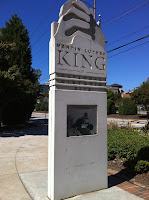This past October while at a conference in Atlanta, a friend and I took a side trip downtown to see the Martin Luther King, Jr. National Historic Site and the surrounding buildings. I had been before, but the older I get the more I realize the significance of this man's life.
I have confessed before that the Civil Rights Movement went on outside my personal, suburban experience. I knew something was going on by the news I watched occasionally at night after we ate, but I never encountered the movement firsthand. Like many white Americans, I was sympathetic to the situation of Afro-Americans in my country but let the work and death of others right the wrong.
Two quotes from Dr. King caught my attention on this trip. I have not looked up their source, but they are on postcards I bought in the museum gift shop. The first is:
"The true neighbor will risk his position, his prestige, and even his life for the welfare of others. In dangerous valleys and hazardous pathways, he will life some bruised and beaten brother to a higher and more noble life."
That statement is a call to authentic Christianity. Jesus, the foundation for Dr. King's non-violent message and actions (He was a Baptist preacher.), spoke of the same kind of actions in his story of the Good Samaritan.
The second still rings true today. Especially, in too many evangelical churches and in a world of sound bites and 3-minute video clips.
"Rarely do we find men who willingly engage in hard, solid thinking. There is an almost universal quest for easy answers and half-baked solutions. Nothing pains some people more than having to think."
We don't think anymore. We give opinions based on emotion. That kind of rhetoric keeps many apart still today.
Dr. King began a revolution of justice that has not ended. Much remains to be done to bring dignity and respect to all people. My prayer is that God's people, like those first marchers, will stand up again and be the voice and strength for those who have neither.
I have confessed before that the Civil Rights Movement went on outside my personal, suburban experience. I knew something was going on by the news I watched occasionally at night after we ate, but I never encountered the movement firsthand. Like many white Americans, I was sympathetic to the situation of Afro-Americans in my country but let the work and death of others right the wrong.
Two quotes from Dr. King caught my attention on this trip. I have not looked up their source, but they are on postcards I bought in the museum gift shop. The first is:
"The true neighbor will risk his position, his prestige, and even his life for the welfare of others. In dangerous valleys and hazardous pathways, he will life some bruised and beaten brother to a higher and more noble life."
That statement is a call to authentic Christianity. Jesus, the foundation for Dr. King's non-violent message and actions (He was a Baptist preacher.), spoke of the same kind of actions in his story of the Good Samaritan.
The second still rings true today. Especially, in too many evangelical churches and in a world of sound bites and 3-minute video clips.
"Rarely do we find men who willingly engage in hard, solid thinking. There is an almost universal quest for easy answers and half-baked solutions. Nothing pains some people more than having to think."
We don't think anymore. We give opinions based on emotion. That kind of rhetoric keeps many apart still today.
Dr. King began a revolution of justice that has not ended. Much remains to be done to bring dignity and respect to all people. My prayer is that God's people, like those first marchers, will stand up again and be the voice and strength for those who have neither.


